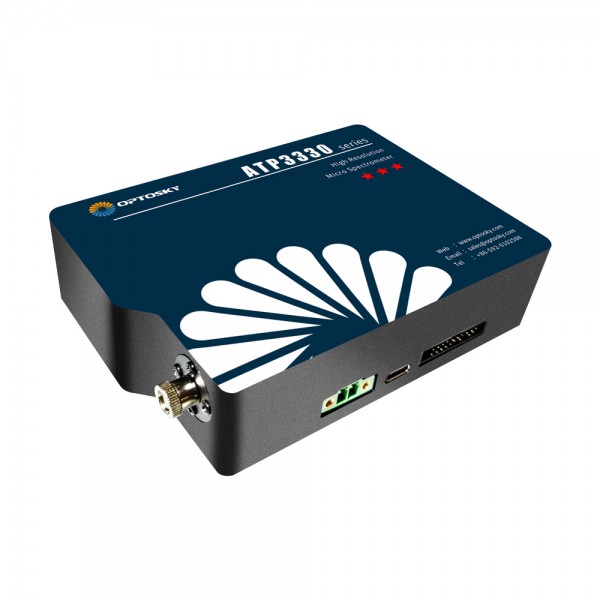Your shopping cart is empty!
Uncooled, High Resolution Spectrometer
Availability: In Stock
Uncooled, High Resolution Spectrometer
Product Code: ATP3334
application
- ATP3334 is newly designed ultra thin, cooled, ultra high resolution miniature spectrometers developed by Optosky. ATP3334 are m-type optical path structures, which have extraordinary ultra-high resolution. Uncooled 4096 pixels at the same time, it uses the linear array detector, reached the acme of the ultra high resolution, high resolution can reach <0.04 nm, suitable for all kinds of applications, high resolution and high reliability, ultra-high speed, low cost, high cost performance and other characteristics, can adapt to the online test uses a variety of environments such as micro spectrometer.
- ATP3334 is uncooled, which greatly reduces the dark current and noise , improves the dynamic range and signal-to-noise ratio, and improves the environmental adaptability of the spectrometer.
- ATP3334 can receive SMA905 fiber input light or free space light, and output the spectral data obtained through USB2.0 or UART port.
- ATP3334 has free SDK for customers self-developed, Optosky support C++, C#, Labview and Linux system SDK, which is very convenient for OEM customers to design solutions.
| Detector | |
| Detector type | Linear array detector |
| Effective pixels | 4096 pixels |
| Pixels dimension | 14μm × 200μm |
| Sensitivity | 1300 V/(lx·s) |
| Dark noise | 13 RMS @ 13 ˚C |
| Range Drift | 200-1100 nm |
| Optical parameter | |
| Focal distance | 75mm |
| Optical resolution | 0.04-3 nm |
| Incident Interface | SMA905 connector |
| Dynamic range | 8.5 x 107 (system); 2000:1 for a single acquisition |
| Working humidity | < 90%RH |
| Wavelength range | 200-1100 nm (optimal design for >500 nm) |
| Slit Size | 50 μm (10, 25, 100, 200 μm are optional) |
| SNR | >600:1 |
| Optical Design | Traditional Czerny-Turner, M-shape light path |
| Physical parameters | |
| Dimensions | 125 × 90 × 32 mm |
| Weight | 500 g |
| Electrical parameter | |
| A/D conversion resolution | 16 bit |
| Integration time | 0.1 ms - 256 second |
| Interface | USB Type-C |
| Supply voltage | DC 4.5 to 5.5 V (type @5V) |
| Operating current | 200mA |
| Storage temperature | -30°C to +70°C |
| Operating temperature | 25 ~ 50 oC |
- M-shape, high resolution;
- Wavelength range: 200-1100 nm;
- Resolution: 0.05~ 2 nm;
- Optical path: M-shape C-T;
- Detector: 2048/4096 pixel;
- Integration time: 0.2ms ~ 65s;
- Power supply: DC 5V power supply;
- ADC:16 bit;
- Output:USB Type-C;
- 20-pin expansion interface;
What are the applications of the ATP5330 (UnCooled) Ultra-thin&High resolution spectrometers?
- LIBS, Plasma luminescence detection;
- Raman detection;
- Wavelength monitoring, laser, LED and other luminous bodies
- Water quality analyzer
- LED sorting machine, color detection;
- Spectral analysis, radiation spectroscopic analysis, spectrophotometric analysis;
- Reflection and transmission spectrum detection
How to select High resolution & uncooled spectrometer from Optosky?
Optosky ATP3XXX series are high resolution and uncooled spectrometer.
ATP3000 (2048pixels) & ATP3040 (4096pixels) both uses crossed C-T, higher sensitivity, they are usually used to replace HR2000 and HR4000
ATP3030 (2048pixels) & ATP3034 (4096pixels) both uses M-shape C-T, higher resolution, low stray light, uv enhanced application is highly recommended.
ATP3330 (2048pixels) & ATP3334 (2048pixels) ) both uses M-shape C-T, higher resolution, low stray light, NIR range can also applicable to high resolution.
How many topology structure of optical path for a spectrometer?
There are commonly divided into 4 types of optical path, including crossed C-T, M-shape C-T, concave grating optical path, transmittance grating opitcal path.
Crossed C-T: ATP2000P,ATP2002, ATP2400, ATP1010, ATP5020P, ATP5040, ATP6500
M-shape C-T: ATP3030, ATP3034, ATP3330/4 ATP5030, ATP5034, ATP5330/4
Concave grating: ATP4230, ATP4020, ATP4050, ATP4070
let's see the M-shape optical path looks like a number "3", so our models uses the 3rd number "3" to indicate M-shape optical path models.
In generally, topology structure can decide resolution, sensitivity, stray light, and size of a spectrometer.
Crossed C-T topology structure employs better sensitivity and compact size.
M-shape C-T employs higher resolution and better stray light.
Concave grating optical path employs high stray light










